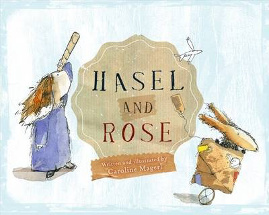Hasel and Rose by Caroline Magerl

Penguin/Viking 2014. ISBN 9780670077342.
'Rose was a new face in a new street. And there was a new town right
outside her window.' What, for some, might be the start of a
new adventure filled with anticipation and excitement, for Rose is a
descent into loneliness and apprehension. Rose looked out her
windows to the stars and wished. But the wish thing which has no
name did not come. It did not make its way across country
sweeping along the powerlines on the great poles that stride across
the land; it did not come swept by stormy winds on a
parachute. Nothing could bring peace and joy to Rosie's heart
until . . .
The publisher's blurb says, 'A magical story of hope and new
beginnings for anyone who's ever loved and lost'. Hasel and Rose
celebrates the power of imagination and resilience, even when things
seem too hard, and it would be difficult to express the theme of
this story better. When parents make a decision to move away from
all that is familiar, there are many worries and what-ifs that haunt
children, often too big for them to articulate and so nothing brings
comfort, particularly with the natural impatience of the
young. But this story, written by someone who, herself, has
experienced dislocation of the familiar and friendly many times and
accompanied by her own evocative hand-coloured etchings which add so
much atmosphere and tension, offers confirmation that sometimes all
it takes is time, and new journeys can happen around any corner.
The journey of the evolution of Hasel and Rose is told by
the author
and it, in itself, is a remarkable piece of writing because it helps
to answer that question that children always ask authors . . . Where
do you get your ideas from? Like many stories, it evolved over a
long period of time, an idea tickling the edges of the mind until it
found a purpose and a pathway to become more. Its crafting and
development is as much of a journey as Hasel's, and that in itself
is a most valuable lesson for students and their teachers to learn.
Great stories cannot be written to order and a timetable, but need
to be nurtured and nourished and allowed to flourish in their own
time . . . just as Rosie did.
Barbara Braxton